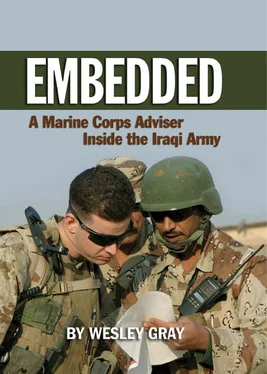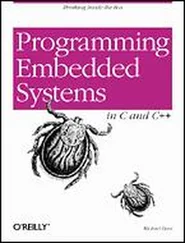Astonishingly, the handling of the new supply dump went extremely well, thanks to Captain Nihad, the S-4 logistics officer. Nihad was the closest thing to a Marine officer in our battalion. He worked extremely hard, he took pride in his work and duties, and his troops faithfully executed his well-conceived plans and orders.
For all the praise I could give Nihad, there was one aspect of leadership that even he failed to perform: leadership by example. Marine officers learn in their first days at Officer Candidates School (OCS) the concept of ductus exemplo, or leadership by example. The idea is simple and time tested: an officer, or any sort of good leader for that matter, does what his subordinates do, regardless of how dreadful the task may be. This in turn gains the subordinate’s respect and encourages them to accomplish the mission. The ductus exemplo concept is foreign to Iraqis. Leadership in their minds is not an opportunity to show the troops any task is possible but an opportunity to force someone under their command to do all the unwanted tasks.
The day the supplies arrived provided a perfect example of the Iraqi leadership trait I call lazimus maximus. Adams and I, feeling sorry for the jundi who were hauling the boxes of supplies in the burning heat, decided to help them finish their job. Nihad immediately scolded us, saying, “Jamal and Adams, what are you doing? Come over here with me in the shade, have a drink, and let the soldiers do that work. Work is not for you!” Samir and Ali, the jundi we were helping, said, “Shukran” (Thanks) and told us to go with Nihad. It was obvious they appreciated our help and respected us for putting in the effort. We wanted to continue helping the soldiers, but our basic knowledge of Arab culture gave us the good sense to go with what Captain Nihad wanted. Telling him he was wrong in front of his troops would have led to bigger issues. Later, in a more private arena, we explained to him the concept of ductus exemplo. I doubt he listened, but perhaps over time he learned.
The Iraqis finally squared away their new supplies into the supply area. Overall, it was an impressive effort by Iraqi standards. Nobody shot themselves in the foot, nobody slept on the job, and the actual mission was accomplished. After the event Samir and some other jundi demanded Adams and I come to lunch with them. There was no getting out of this one. Beans, rice, chicken, and khubbis are good for perhaps the first twenty times, however, by this point it was getting old. Nevertheless, in an effort to continue to build relationships with the jundi , we ate with our friends (see photo 12).
Here is a paradox. Modern mathematics is based on the number system developed by the Arabs, yet somehow many Arabs do not understand simple arithmetic. My guess is there is some other element involved. In the case of the Iraqi S-1 shop, this other element is lying. Abdulrachman, an Iraqi soldier who still held grudges against the Americans for whipping his unit in Nasiriyah during the march up to Baghdad, gave me a lesson in Iraqi math, which uses the Arabic numeral system but has an uncanny ability to defy logic.
For a few weeks Abdulrachman had been telling me they had 134 jundi on leave. During my first couple of weeks here I went with this number, because I assumed a level of professionalism within the S-1. I am a gullible American.
I interrogated the S-1 on their leave counts. “Abdulrachman, I was in the swahuts this morning watching the morning formation and there were only 64 soldiers from H&S battalion present, yet you say there are 84 present?” He responded as though it was obvious. “Jamal, of course, there are only 64, it is just a mistake in the report.” I had him by the balls. “So Abdulrachman, if you agree with me there are only 64 soldiers on hand, that must mean there are 20 soldiers who took two consecutive ten-day periods of leave, correct? You really have 154 currently on leave, not the 134 you keep telling me?”
Abdulrachman acknowledged the mistake. “Jamal,” he said, “I am sorry, you are correct, I will fix it now. Sorry for all the confusion, you can trust me in the future. I am a very good S-1.” I played the part of the ignorant American and smiled in response. He took the bait and assumed I did not figure out his hidden agenda, which was to fake the accountability numbers so certain Iraqi soldiers could take extended twenty-day leave sessions. It seemed Iraqis were often trying to cheat the system, a trait heavily reinforced under Saddam Hussein’s regime.
I finally understood why the generals told us that accountability, leave, and pay issues are the Achilles heel of the Iraqi army (logistics are the Iraqi army’s kryptonite). Accurate accounting of Iraqis is an impossible business when the incentives for numbers to be accurate are not there. I remember a Washington Post article in late 2004 in which the Iraqi government claimed it could do a nationwide census in a day. The idea was to shut down the country and send out 150,000 schoolteachers to get an accurate number of the country’s population. My question was this: if Iraqis cannot account for a battalion’s worth of soldiers who they can physically line up and count, how can they expect to count the unorganized masses throughout Iraq? When you add the multiple layers of incentives for the census data to be tilted one way or the other by various religious, tribal, and ethnic groups, it only adds to the potential confusion. My guess is that any census data compiled in the post-Saddam era has a 20 to 30 percent error rate—at a minimum.
When it comes to chow distribution, the U.S. military is hands down the most effective military organization on the planet. One day on a leave run, Adams and I, with the help of Amir and his Leyland flatbed pickup, went to pick up food items at Al Asad’s food distribution center. We followed a U.S. Army sergeant around the chow supply area and loaded up on various goods. We were sweating our asses off in the 130-degree heat. Thankfully we soon came to the meat freezer. When the sergeant opened the door on the freezer, a crisp blast of air engulfed us.
Amir seized the opportunity to cool off. He dropped out of the driver’s side of the Leyland and moved around the Leyland’s engine compartment to help us load supplies. At the first hint of cool air, he sprinted for the freezer. Amir dove into the meat freezer at full speed and bellowed at the top of his lungs in his best English, “Welcome to Amreeyca! I love Cali-forniya!” He fell to the freezer floor and rolled on the ground. He continued his rant, shouting, “I love Cali-forniya, I hate Iraq, please take me Amreeyca!” We all laughed hysterically. Although we could not believe what we were seeing, we definitely understood the logic behind it. It was hot as hell, the freezer felt damn good, and food was plentiful.
After loading all the frozen meats we could carry, we closed the large freezer doors. We had one problem, though. Amir would not leave. He was clinging to the floor like a leech. We eventually had to peel him off the ground. We next moved to the dry goods food area and filled the Leyland to the brim with food. Now the MiTT could survive happily for at least a few weeks without resupply and we could help the Iraqis if their situation became even more dire than it already was.
The U.S. military chow supply is abundant and organized, but the Iraqi chow supply system is criminal. We returned to the brigade camp on Al Asad to wait for the Iraqi chow to arrive. As usual the Iraqi food contractors had collected their paycheck without providing a service. No food arrived. Once again the Iraqis would have to rely on the U.S. taxpayer to provide their food. We were at a point that our battalion might starve. Just the week before, during an inventory of Iraqi chow, the counts were sparse: ten bags of potatoes—all of which were rotten, a box of tea, a few cans of peas, a small container of tomato paste, and seven twenty kilogram rice sacks. Ahmed Rial, the food contractor on our camp, gave me his assessment of the situation. “Jamal, we have enough chow for roughly three days, but they will be fed like prisoners.” I could not have agreed more with Rial’s assessment.
Читать дальше












